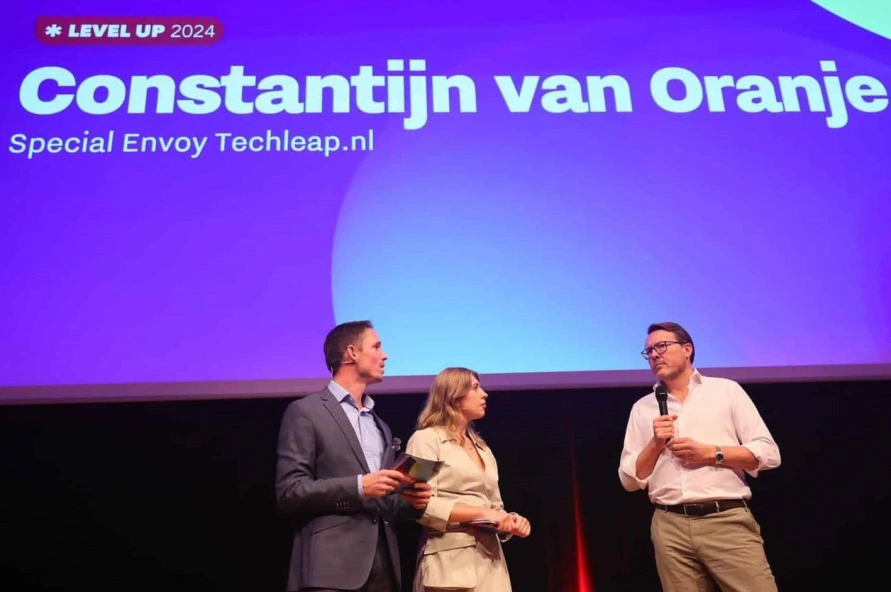During the kickoff session of the LEVEL UP 2024 event, on September 30 at the Evoluon in Eindhoven, the words of Prince Constantijn were mainly intended as a challenge for startups and entrepreneurs. His main messages: failure is not something to be afraid of, but rather a marker of effort and ambition, you must understand the customer's problem well, pivot when necessary, and build with resilience. "Success is for those who persevere, adapt and remain open to new opportunities, while at the same time contributing to a robust entrepreneurial ecosystem."
Prince Constantijn van Oranje, special envoy at Techleap and an important advocate for the Dutch startup ecosystem, used his LEVEL UP session to share insights about failure, scaling, and the importance of startup validation.
Hardt Hyperloop
"Failure is a difficult concept to grasp," said Constantijn. "If you have never seen anything fail, then you probably have not tried hard enough to build something great." According to him, it is only truly a failure if someone has not dared to build something significant. Instead, what people often consider failures are lessons that contribute to eventual success.
An example he cited is Hardt Hyperloop, a company venturing into uncharted territory to build a completely new form of transport. Despite needing substantial support from regulatory bodies and capital, they have persevered and continue to innovate. "With frugality, modesty, and smart operations, you can go a long way," explained Prince Constantijn, highlighting the value of a strong vision and determination.

Asked about common mistakes startups make, he pointed to the validation phase as a critical area where entrepreneurs often rush. “It’s super relevant to truly understand your customer – who they are and what they need – before you scale,” he emphasized. This is especially crucial for startups in deep tech and hardware, where building advanced technology often precedes identifying the core problem of the customer.
Prince Constantijn shared a case study illustrating the importance of pivoting and customer validation. A company initially focused on creating a computer-brain interface for ALS patients had to pivot when they found a more commercially viable application for the technology in diagnosing hearing problems in children. “It is very difficult when you want to solve a problem from a specific thought,” he noted, “and then find out that the commercial application may lie in a completely different area.”
Is the problem big enough?
Understanding who is willing to pay for the solution is essential for success. “Is the problem big enough?” he asked, emphasizing that an entrepreneur's journey requires a continuous assessment of market fit.
Prince Constantijn discussed the challenges of scaling startups, noting that some entrepreneurs find starting more difficult, while others struggle to focus on one proposition. “For me, starting is much more difficult than scaling. It is crucial that you, as an entrepreneur, know what you are good at and what you are not,” he advised. Building a complementary team and aligning with investors is essential, especially to avoid misaligned milestones derailing a company.
In his capacity with TechLeap, an organization supporting the Dutch tech ecosystem, Prince Constantijn highlighted various programs designed to help startups at different growth stages. The "Rise" program, for example, focuses on scaling challenges and offers peer-to-peer learning with experienced entrepreneurs. TechLeap also offers a pre-revenue program called “Pole Position” for deep-tech companies to tackle obstacles at an early stage. Moreover, they organize the “Academic Startup Competition,” a support program that helps startups in their early years.
Get the most out of LEVEL UP
When asked how startups can make the most of events like LEVEL UP, Constantijn emphasized preparation and openness. “Know what you are coming for,” he advised, while also encouraging participants to embrace serendipity. “Don’t just sit at the coffee table with the people you know. Reach out to others; perhaps there is a piece of the puzzle you’re missing.”
This article was written in collaboration with and published on Innovation Origins, media partner of LEVEL UP.
